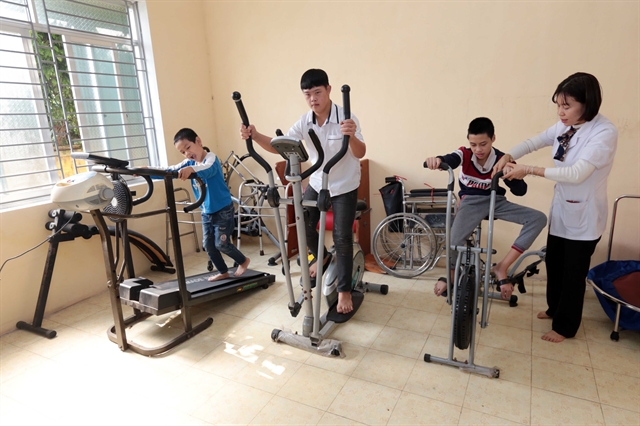 Society
Society

People with disabilities were among the hardest hit by the COVID-19 pandemic, said a rapid assessment announced by the United Nations Development Programme on Tuesday.

|
| People with disabilities exercise at a rehabilitation school in Khoái Châu District, northern province of Hưng Yên. — VNA/VNS Photo Phạm Kiên |
HÀ NỘI — People with disabilities were among the hardest hit by the COVID-19 pandemic, said a rapid assessment announced by the United Nations Development Programme (UNDP) on Tuesday.
With support from the Australian Department of Foreign Affairs and Trade, the Embassy of Ireland in Việt Nam and the Korea International Cooperation Agency, the UNDP organised the assessment to help identify health and socio-economic challenges faced by people with disabilities and their families during COVID-19 to offer targeted support and responses for them.
Nearly 1,000 people with different disabilities - physical, hearing and speech, visual and psychosocial, including those from ethnic minority groups from cities and provinces throughout the country - participated in the assessment.
The rapid assessment reveals that 82 per cent of respondents expressed concern about protecting their health and 96 per cent expressed concern for their financial security during COVID-19.
Up to 70 per cent of respondents had found it challenging to access medical care, including check-ups, medicine, assistive devices and rehabilitation services, whereas 22 per cent of them were suffering from underlying medical conditions potentially putting them at heightened risk of COVID-19.
As of March 2020, 72 per cent of people with disabilities across the country had a monthly income of less than VNĐ1 million (US$43).
As many as 30 per cent of them had been made unemployed due to COVID-19, whereas 49 per cent were working reduced hours and 59 per cent had taken a pay cut.
More than 70 per cent of working people with disabilities had seasonal jobs or owned an informal business, so were at risk of being ineligible for allowances from the Government’s social welfare response package, said the assessment.
Addressing the launch, UNDP Resident Representative in Việt Nam Caitlin Wiesen highlighted the importance of a disability-inclusive response to the efforts underway to address COVID-19.
“While people living with disabilities have been disproportionately impacted by COVID-19, at the same time, they have a vital role and contribution to make in overcoming and co-existing safely with COVID-19 in Việt Nam,” she said.
“We must support persons with disabilities to develop skillsets to make full use of new digital platforms, creating more working from home and online employment opportunities, that enable them to work safely and competitively in the new industry 4.0 environment,” she said.
New ways of working could help many persons with disabilities to improve their income opportunities and continue to make significant contributions to Việt Nam’s economic recovery, she added.
The report suggested providing emergency relief for the urgent needs of persons with disabilities, including medical care and services, and telehealth services where appropriate.
The aim of the report was to ensure that the Government’s support package was disability-inclusive in the informal sector and ensured people with disabilities’ financial security and education continuation with the provision of online jobs, accessible applications and digital platforms.
The rapid assessment suggested extending coverage of disability certificates to include the wider population of people with disabilities and conducting a comprehensive assessment of the impacts of COVID-19 on people with disabilities, with the full participation of those in the country, to design and implement response and recovery programmes. — VNS




